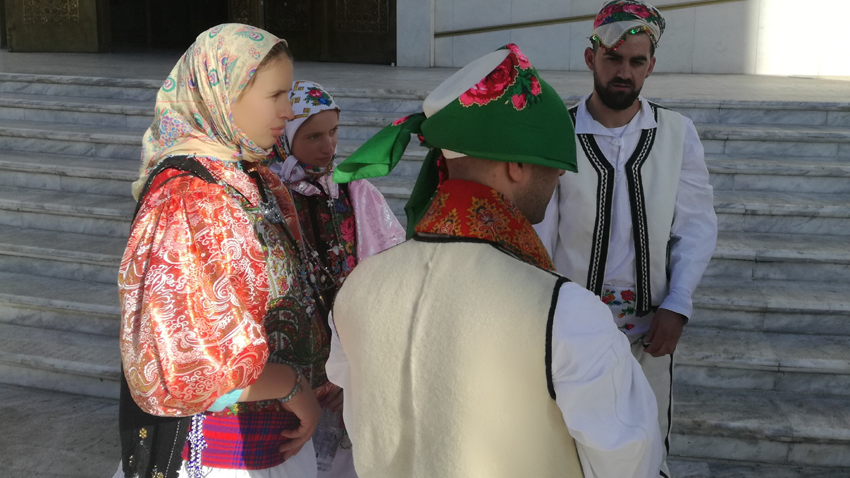These days, the whole of Europe follows closely with concern and compassion the situation in Albania after the devastating November 25 earthquake. Like many other countries, Bulgaria has also expressed its support by sending humanitarian aid, and the government has allocated 200,000 BGN for this purpose. Our diplomatic mission there has also opened a crisis response centre.
There is a large Bulgarian minority in Albania. On October 12, 2017, an amendment was adopted to the Minorities Protection Act of Albania, which officially recognized the rights of citizens of Bulgarian ethnic origin in the area of Prespa, Golloborda and Gora. However, unlike other communities in Albania, which live within geographically connected territories, the Bulgarian minority is scattered in small villages unconnected with each other. Golloborda, Gora and Prespa are also some of the poorest areas of Albania.
We speak an old Bulgarian language, he says as we speak to him in Albania’s capital Tirana. We learned it from our parents and our grandparents. At school we study only Albanian. Bulgaria does not send us teachers. We are such a big village and we don’t have a single teacher in Bulgarian. And many of the young people, after graduating, go to study at university in Sofia, I also want to go. All the children who are here want to go to Bulgaria, our entire village. Now there are only 160 houses left in Shishavets, around 300-400 people. Everyone else had run away. There’s no work. Our main livelihood is cattle breeding. What can you do with only cows, sheep and so on. And if Bulgaria accepts me I can do anything. I'll go to university. I want to deal with winter sports. My family has a tradition in this sport.
The majority of the inhabitants of are Gorani who are Muslims. In fact, the Bulgarian community in Albania is religiously diverse. Orthodox Christians live in Prespa, the community in Golloborda is mixed, and the Muslim population is predominant in the Gora region.

The village of Vrabnik is part of Devoll municipality, Korca district. There is a Bulgarian Sunday school operating there. Atina Prevenda is a teacher in it and is also the head of the local band for Bulgarian folk dances. She tells us more about preserving Bulgarian folklore and the Bulgarian identity.

The kids attend Sunday school and study Bulgarian. We have been doing this for two or three years, but otherwise we talk at home in our native Bulgarian language. The young people are interested in everything. They like Bulgarian dances, they also read in Bulgarian. They still have difficulties but they cope with it. They have textbooks and learning materials that the Bulgarian state provides.
It is expected that the Bulgarian community will also have its own Bulgarian-language radio soon. The documents are currently being prepared, Haxhi Pirushi explains. He is an Albanian public figure of Bulgarian descent and currently the chairman of "Prosperity Golloborda " - a cultural organization of the Bulgarians there founded almost 20 years ago. We talk to him in front of the Orthodox Church in Tirana:

We speak Bulgarian, we sing in Bulgarian and we weep for all things Bulgarian. In my home village of Steblevo we are now to open a Bulgarian church - St. Nicholas. We built it on top of the foundations of an older church. This is the first investment from Bulgaria for our area. It is good that we are already an officially recognized minority, because years ago it was very difficult to be Bulgarian. We have had a Sunday school for a few years, but that is not enough, it would be good to have more Bulgarian media, to have Bulgarian television and Bulgarian radio stations. We have long been in contact with Radio Bulgaria, which I love very much. Very helpful for us are the daily updates and news about Bulgaria and almost every day I visit your website. It's good that there you can read news and articles or hear a report on a particular topic in both Bulgarian and Albanian, Haxhi Pirushi concludes.
English Rossitsa Petcova
(Photos and video footage: Krassimir Martinov)
The traditional Bulgarian Christmas picnic, organized by the Bulgarian Cultural and Social Association "Rodina - Sydney" and the Bulgarian School "Dr. Petar Beron", will take place on December 8 , 2024 in St. Leonards Park in Sydney. "We have..
The Bulgarian national minority in Albania is one of the largest in the country, according to data from the latest official population census. A total of 7,057 individuals identified as Bulgarians. For comparison, 23,000 people identified as Greeks,..
From today, residents of Stara Zagora, young and old, can send their letter to Santa Claus. A letterbox has been set up in the foyer of the city's State Puppet Theatre to collect messages for Father Christmas. The cultural institution guarantees that..
The traditional Bulgarian Christmas picnic, organized by the Bulgarian Cultural and Social Association "Rodina - Sydney" and the Bulgarian School..

+359 2 9336 661
